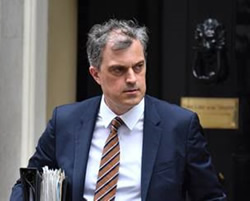NORTHERN IRELAND
 The three-year Government by Public Servants in Northern Ireland is at an end after the stalemate between the Province’s two main political parties was broken.
The three-year Government by Public Servants in Northern Ireland is at an end after the stalemate between the Province’s two main political parties was broken.
The United Kingdom and Irish Governments agreed to a deal that included extra funding and the promise of improved transparency and accountability in order to resume the power-sharing arrangement that has been in existence since the Good Friday Accords in the 1990s.
Since the collapse of the Northern Ireland administration following a falling out between coalition partners Sinn Féin and the Democratic Unionist Party (DUP) in January 2017, Public Servants have run the Province without the guidance of Ministers.
The deal was outlined in a 62-page document titled New Decade, New Approach, which was presented by Secretary of State for Northern Ireland, Julian Smith (pictured) and Irish Tanaiste (Deputy Head of Government), Simon Coveney.
The deal includes extra funding for Northern Ireland – the document cites a “multi-year program for Government, underpinned by a multi-year budget and legislative program” – though the exact amount of additional funding is not yet known.
It also promises the creation of two ‘language commissioners’ in a bid to remove barriers that have blocked previous attempts to revive the Assembly, plus improved accountability.
This includes the need for Public Servants to record Ministerial meetings, and examination of the behavioural standards governing how Public Servants, Ministers and Special Advisors conduct themselves.
The stalemate between Sinn Féin and the DUP was sparked by flaws in a DUP-led green energy scheme and was prolonged by arguments over issues such as the status of Ireland’s indigenous Gaelic language as well as by the DUP’s power in Westminster.
Head of the Northern Ireland Public Service, David Sterling, who has announced plans to retire, has repeatedly called for the restoration of power-sharing.
Belfast, 13 January 2020











